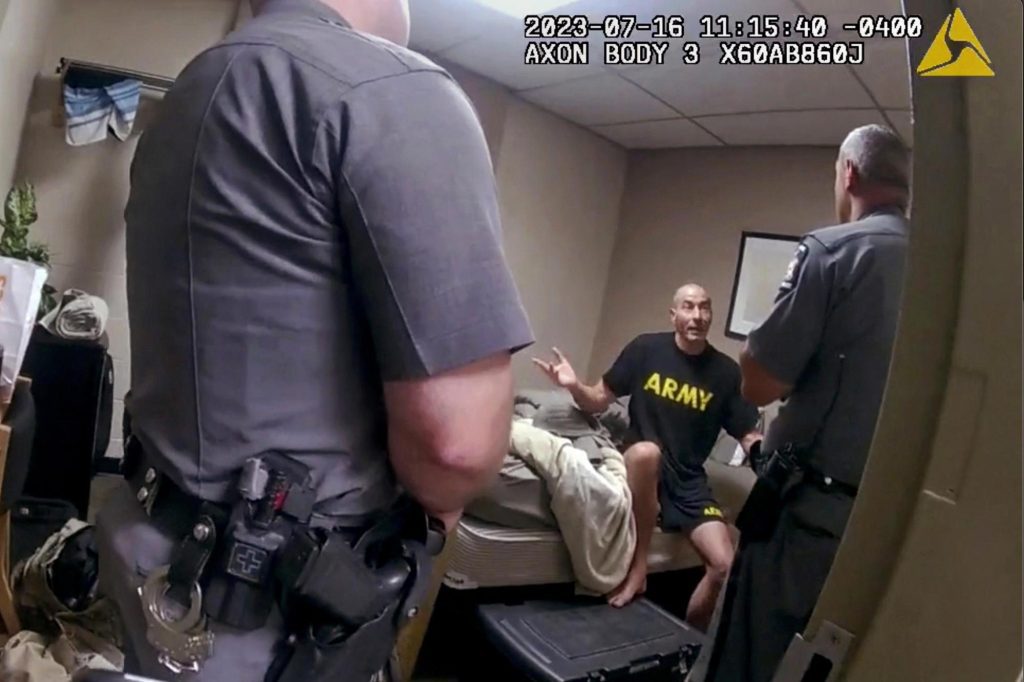By HOLLY RAMER and MICHAEL CASEY (Associated Press)
BOSTON (AP) — Experts who know about brain injuries are warning against making conclusions based on limited information about a brain injury in an Army reservist who killed 18 people in Maine's deadliest mass shooting last year.
A research team at Boston University found signs of traumatic brain injury in Robert Card's brain tissue, as requested by the Maine medical examiner. The degeneration in nerve fibers, inflammation, and small blood vessel injury were discovered by Dr. Ann McKee of the university’s Chronic Traumatic Encephalopathy (CTE) Center.
Card had been an instructor at an Army hand grenade training range, where it is believed he was exposed to repeated low-level blasts. It is unknown if that caused Card’s brain injury and what role the injury may have played in his declining mental health before he opened fire at a bowling alley and bar in Lewiston on Oct. 25.
McKee did not connect the injury to Card’s violent actions.
McKee mentioned that she couldn't confirm if these brain findings caused Mr. Card's behavioral changes in the last 10 months of his life, but she believes that brain injury likely had a role in his symptoms based on their previous work.
Dr. Alexandra Filippakis, a neurologist, said she wouldn't conclude that brain injury influenced Card’s behavior based on McKee’s findings.
“TBI is a very broad diagnosis, and it looks different in different people. Not everybody has the same symptoms. Not everybody has the same severity of symptoms,” Filippakis said. “There’s no way that you could, with certainty, link that to a particular action.”
Filippakis mentioned that the connectivity damage described by McKee is common and can have many causes, including aging, high blood pressure and smoking.
“That could mean so many different things,” she said. “You certainly can’t draw any conclusions from that piece of information.”
James Stone, a University of Virginia radiologist, said changes to Card’s brain seemed significant.
He explained that such injuries can affect impulse control and emotional regulation, and although he doesn't know if those parts of Card’s brain were affected, he thinks it’s hard to believe that the level of brain changes did not contribute to his behavior.
Chris Dulla, a professor at Tufts School of Medicine, said he was surprised that researchers found no evidence of chronic traumatic encephalopathy, which has affected many professional football players.
“It doesn’t seem to be as cut and dry,” he said. “What that speaks to is how varied traumatic brain injuries are, and how difficult they can be to diagnose, even in the postmortem brain sample, when you can study every detail.”
Dulla mentioned that the findings emphasize the link between brain injuries and underlying psychological conditions.
He mentioned that if someone is already dealing with a psychiatric condition or at risk for one, then brain injuries could potentially worsen the condition and make it more noticeable compared to before.
Specialists say that traumatic brain injury can lead to headaches, mood changes, memory loss, and sleep problems. Stone's research revealed that even exposure to low-level blasts can result in brain changes. The Department of Defense has been actively studying this issue, and a panel on which he serves is expected to release new guidelines in May for both the U.S. military and NATO allies.
He said that they have been very proactive about this.
An Army spokesperson expressed concern about the lab findings regarding Card and stated the Army's need to do everything possible to protect Soldiers from blast-induced injury.
Apart from updating the guidance on risk mitigation, the Army intends to launch a public safety campaign and will start requiring documentation of training environments and tracking of exposed personnel.
Card’s close friend and fellow reservist, Sean Hodgson, mentioned that safety was a top priority at their training range and the blast exercises were well controlled.
He mentioned that it's a mild sensation.
In his view, it's one of the safest ranges to be on, and he stated that he never heard Card complain about the blasts.
Six weeks before the shooting, Hodgson texted an Army supervisor expressing his growing concerns about Card, indicating his belief that Card was going to snap and commit a mass shooting.
That Sept. 15 message came months after relatives informed police about Card's growing paranoia and expressed concerns about his access to guns.
Card spent two weeks in a psychiatric unit in July after pushing a fellow reservist and locking himself in a motel room. In August, the Army prohibited him from handling weapons while on duty and declared him nondeployable.
In their first public comments since the shooting, Card’s family members apologized Wednesday for the attack, expressing their sorrow for the victims, survivors, and their families.
They mentioned in a statement that they are hurting for and with the victims and find it difficult to express how much they wish they could undo what happened. They also stated that they are releasing the findings of Robert’s brain study with the aim of supporting ongoing efforts to learn from this tragedy to ensure it never happens again.
___
Ramer reported from Concord, New Hampshire.









